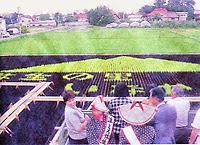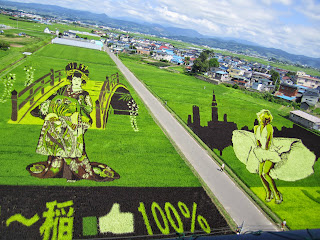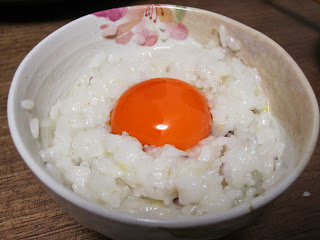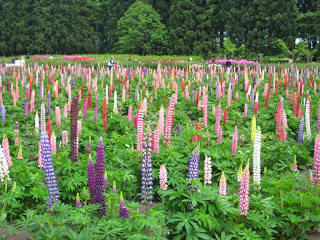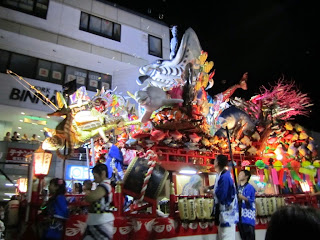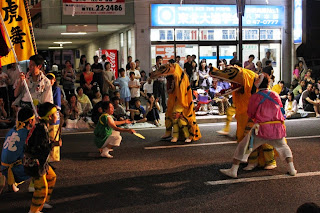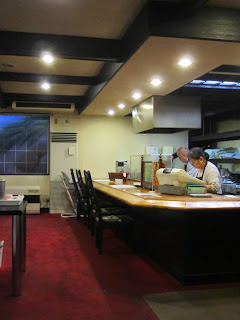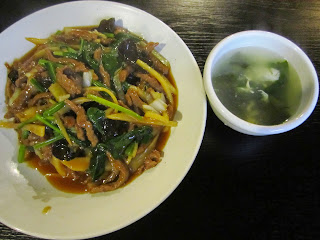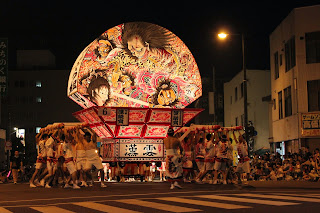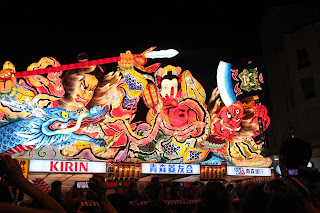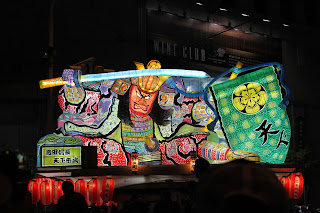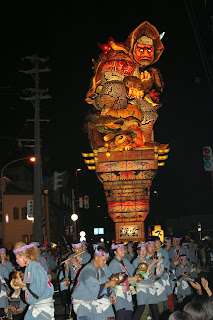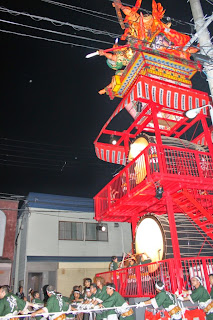It is a hot and muggy August night, but the air is filled with energy and a sense of anticipation. Then the sounds of flutes, drums, and chanting shouts erupt as people dressed in happi coats, yukata and all manner of costume fill the street, and enormous glowing figures emerge from between the darkened buildings.
There are many festivals across Aomori Prefecture and all of Japan during the summer, but Aomori's three biggest and most famous summer festivals are Hirosaki Neputa, Aomori Nebuta, and Goshogawara Tachineputa.
All three feature impressive night parades of neputa/nebuta--large lantern floats with images and themes drawn from Chinese or Japanese literature, history, or religion--pulled by large groups of people often dressed in special costumes and accompanied by music from flutes, drums, and hand cymbals. The groups pulling the floats also use special shouts (different for each festival) to keep both the participants and spectators energized.
Although the exact origins and meanings of the festivals are unclear, it is thought that they developed from the Tanabata* Festival's Nemuri Nagashi where people placed paper dolls, lanterns, or bamboo, etc. on boats and set them afloat down rivers or into the sea to symbolize washing away farmers' summertime sleepiness in preparation for the fall harvest season.
(*Tanabata, also known as the "Star Festival" is celebrated on the 7th night of the 7th month--the only time when Orihime and Hikoboshi (Vega and Altair), star-crossed lovers who are separated by the Milky Way, are able to meet.)
Although there are many similarities among them, each festival has its own unique style and atmosphere.
HIROSAKI NEPUTA
Hirosaki Neputa features fan-shaped with illustrations representing images and themes from Chinese literature such as The Romance of the Three Kingdoms and Water Margin. There is often nudity and/or grotesque images such as severed heads and bloodied people depicted on Hirosaki Neputa. The often darker tone and relatively smaller size of the floats, as well as the strong involvement of community groups in the making of the floats as well as the parade itself (compared to the increasing commercialization of Aomori and Goshogawara's floats) give Hirosaki Neputa the most intimate feeling of the three festivals.
Dates: August 1-7
Schedule:
August 1-4: Dotemachi Course (19:00 start)
August 5-6: Ekimae Course (19:00 start)
August 7: Nanuka-bi (Final Day) Dotemachi Nanuka-bi Course (10:00 start)
Festival "Shout": Yayado, yayado!
Website: Hirosaki Tourism and Convention Bureau: Hirosaki Neputa Festival Information
More Information: Aomori Sightseeing Guide: Hirosaki Neputa Festival
AOMORI NEBUTA
Aomori Nebuta is the more well-known of the festivals both within Japan and internationally. In 1980 it was designated as an Important Intangible Folk Cultural Property of Japan. Aomori Nebuta are larger than Hirosaki's and mostly feature human figures. When they come to an intersection, the floats are spun around at an impressive speed considering their size. Anyone dressed in the appropriate garb (many shops offer costume rental and dressing services) is welcome to join in the jumping and shouting, making Aomori Nebuta the most lively of the three festivals.
Dates: August 2-7
Schedule:
(August 1: Festival Eve: Performances (18:00 start)
Fireworks (19:00 start))
August 2-3: Children's Neputa & Large Floats (19:10 start)
August 4-6 Large Floats (19:10 start)
August 7: Daytime Large Floats Parade (13:00 start)
Fireworks & Boat Parade (19:15 start)
Festival "Shout": Rassera, rassera!
Website: Aomori Neputa Festival
More Information: Aomori Sightseeing Guide: Aomori Nebuta Festival
GOSHOGAWARA TACHINEPUTA
Goshogawara Tachineputa features extremely tall, towering Neputa floats. The average float is 20 metres tall, making Tachineputa floats the most impressive of the three festivals. The oldest records of Tachineputa date back to 1907, but with the increase in electrical power lines during the Taisho Period (1912-1926), the size of the floats had to be scaled back. Then two devastating post-war fires destroyed records and schematics for the large floats and consequently Tachineputa was lost to obscurity until schematics and pictures were found in 1993, enabling the revival of the tradition. But even then it took several years to re-wire the city's power lines to create a safe path for the floats, so the revival of Goshogawara's Tachineputa Festival didn't come about until 1998--nearly 80 years since the last time the event was held!
Dates: August 4-8
Schedule:
(August 3: Festival Eve: Fireworks (19:30 start))
August 4-8: Night Time Parade (19:00 start)
Festival "Shout": Yattemare, yattemare!
Website:
Tachineputa no Yakata (Japanese)
More Information: Aomori Sightseeing Guide: Goshogawara Tachineputa Festival

